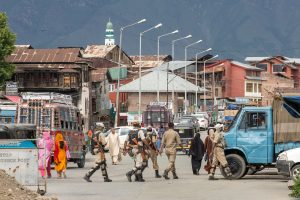India’s Prime Minister Narendra Modi has taken a step toward reviving the political process in the erstwhile state of Jammu and Kashmir (J&K). He has invited leaders of 14 political parties for talks in New Delhi on June 24. His outreach is an important milestone in J&K’s turbulent relationship with New Delhi.
It has come almost two years after the Modi-led Bharatiya Janata Party (BJP) enraged Kashmiris by abrogating J&K’s autonomy.
It was on August 5, 2019 that the Modi government announced the decision to abrogate J&K’s autonomy and to bifurcate the erstwhile state into two union territories, J&K and Ladakh.
Anticipating mass protests to the deeply controversial decision, the Modi government detained hundreds of J&K’s political leaders and activists. Mobile phone and internet connectivity in the Kashmir Valley was shut down for months on end.
The Modi government’s crackdown on the valley not only stamped out protests but also paralyzed political activity.
However, the undermining of political processes in J&K began much earlier. In June 2018, the BJP pulled out of J&K’s coalition government. It led to the collapse of the People’s Democratic Party (PDP)-BJP government in the state. J&K came under governor’s rule and, after its assembly was subsequently dissolved, president’s rule. J&K has not had an elected assembly since.
Modi’s outreach to J&K’s political parties seems aimed at kick-starting this comatose political process.
While the agenda of the New Delhi meeting has not been announced yet, Modi is expected to discuss the holding of elections to the J&K assembly.
Among those invited for the meeting are the People’s Alliance for Gupkar Declaration (PAGD), which comprises among others J&K’s main parties like the PDP and the National Conference (NC). Other invitees include the J&K Apni Party, the People’s Conference, J&K National Panthers Party, the BJP, and the Congress.
How many of the invitees will show up at the upcoming meeting is unclear at the moment, but early signs are positive as several parties are holding meetings to finalize strategies and positions.
So what underlies the Modi government’s outreach to J&K’s political leaders after at least two years of undermining them?
The international community has been criticizing the Modi government for the repression it has unleashed in Kashmir. India’s relations with the United States have not improved with Joe Biden becoming president. Modi’s assault on the democratic rights of Kashmiris has stood in the way of bilateral ties warming.
It is evident too that Modi’s attempts to prop up political alternatives to the PDP and NC failed, as did its efforts to restore a semblance of normalcy in the Kashmir Valley.
To make any headway in the valley, New Delhi would need to deal with J&K’s main parties and politicians across the board – puppets were not enough to jump-start political activity – and hold assembly elections to revive the stalled democratic process. For elections to be credible, it would need to get as many parties as possible on board. Hence, Modi’s offer of a face-to-face meeting with J&K’s political leaders.
It will be difficult for J&K’s leaders to participate in the New Delhi talks, however; cooperation with Delhi evokes anger in the valley at the best of times. After the Modi government’s unprecedented suppression of Kashmiris over the last couple of years, such cooperation is unlikely to get much public support there now.
It is therefore imperative for New Delhi to act in a way that will make it easier for Kashmiri politicians to participate in elections. It must make concessions that will justify their participation in the talks and eventually in elections.
J&K parties are likely to demand restoration of J&K’s autonomy and statehood for their participation in assembly elections. As a first step, Modi could announce a timetable for the restoration of statehood.
So far the Modi government has used the stick to get J&K politicians to toe its line and co-operation with its plans. Leaders were detained for months. Corruption investigations were initiated. These tactics prompted some politicians to join parties that were propped up by New Delhi.
To win the support of Kashmiri politicians for its plans going forward, the center will need to use the carrot too. Statehood for J&K and some amount of meaningful autonomy for the state, even if it is not through restoration of Article 370, could provide both sides with a face-saving exit out of the current impasse.

































